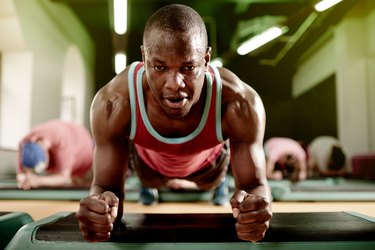
Being drenched with sweat at the end of an exercise session can make you feel like you've worked pretty hard. And when you hop on the scale — hey! — it might even read a few pounds lighter. But does that actually mean that you've lost fat and are getting closer to your weight-loss goal?
The answer might seem like an obvious yes. But the truth is, sweating tons doesn't necessarily mean you're on the path to a smaller jeans size. Here's everything you need to know about sweating and weight loss, plus why sweating too much is dangerous.
Video of the Day
Video of the Day
What Is Sweat, Exactly?
Sweat is a liquid that's released from your sweat glands to help you stay cool when your body temp rises, per the U.S. National Library of Medicine. That can happen during physical activity, of course. But if it's really hot and humid, you can be dripping sweat without even lifting a finger.
Sweat is mostly water, along with some salt and tiny amounts of other compounds like ammonia and urea. It doesn't contain any fat. (Also, a fun fact: The stuff doesn't actually smell on its own at all. It only starts to reek when it mixes with the bacteria on your skin, according to the International Hyperhidrosis Society.)
Sweating and Weight Loss
Can sweating help you lose weight? The answer is… kind of, but not directly. In order to lose weight, you need to burn calories. One pound of fat contains about 3,500 calories of stored energy, so in order to lose 1 pound, that's the number of calories you'd need to burn.
Sweating in and of itself, though, doesn't burn calories. "You can be lying down in a sauna and sweating buckets or sitting outside on a 100-degree day," explains Los Angeles-based personal trainer Jill Brown. "If you're not moving, you're most likely not burning any more calories than if you were sitting in an air-conditioned room."
So why does the scale show a lower number after you've sweat a lot? Sweating does lead to temporary weight loss, but the pounds are from water, not body fat. "It's possible for your body weight to fluctuate 3 to 5 pounds just from water retention or loss," Brown says. So after guzzling a few glasses of H2O to rehydrate, your weight will be right back to where it was before your sweat session.
We lose body fat over time by using more calories than we take in. That can be accomplished by eating fewer calories and by burning them through physical activity.
"On average, a moderate- to high-intensity workout will burn approximately 350 calories an hour, depending on factors like age, gender, muscle mass and type of exercise," Brown says. Do that for an hour every day and cut out 150 daily calories, and you'll have burned around 3,500 calories and lost a pound of fat by the end of the week.
Does Sweating a Lot During a Workout Mean You're Burning More Calories?

Body fat is lost by burning calories, not by sweating. But most of us tend to sweat when we exercise. So is it fair to assume that heavier sweating means you're getting a harder workout — and burning more body fat?
More vigorous activities can cause more sweating than less vigorous ones. But you shouldn't automatically assume that sweating a ton means you worked really hard and burned a ton of calories. Or that not sweating much means you took it easy and didn't burn many calories.
For one thing, some people just tend to sweat more than others. (Thanks, genetics!) Also, environmental factors like temperature and ventilation can have a major influence on how much you sweat, Brown points out.
Case in point: In a July 2013 study done by the American Council on Exercise, researchers had subjects take the same yoga class in a 70-degree room and in a 92-degree room. Even though subjects sweat more and felt like they worked harder in the hotter room, their calorie burn was basically the same during both classes.
The moral of the story: Don't use your sweat to gauge how many calories you're burning. Sweating can be a sign that you're working hard and burning lots of cals, but that's not always the case. If you're trying to keep tabs on your calorie burn, consider using an activity tracker instead.
What Can Sweat Actually Tell You?
You can't necessarily rely on sweat to tell whether you've burned a lot of calories or are losing body fat. So what can those little droplets tell you? "Sweat can let you know how much fluid you're losing," says Jason Machowsky, RD, a sports dietitian and exercise physiologist at the Hospital for Special Surgery in New York City.
Generally, you want to avoid losing more than 2 to 3 percent of your body weight through sweat. (For a 150-pound person, that's 4.5 pounds.) Sweating out more than that can put you at risk for dehydration, which can be dangerous. And if you're exercising, it can potentially cause your performance to decline.
Related Reading
The Risks of Excessive Sweating
Losing a couple pounds of water from sweating isn't a big deal. But losing more than 3 percent of your body weight is dangerous because it puts you in the dehydration zone. In serious cases, dehydration can lead to heatstroke, urinary and kidney problems, seizures and shock, per the Mayo Clinic.
Signs of Dehydration
- Thirst
- Peeing less often, or having pee that’s a darker color than usual
- Fatigue
- Dizziness
- Confusion
- Dry skin
- In severe cases, fainting, rapid heartbeat and/or rapid breathing
Anyone can become dehydrated from sweating, but you're at higher risk if you're working out in a hot or humid environment, exercising vigorously or not replenishing lost fluids by drinking more water. "An issue I sometimes see is people start workouts dehydrated, by exercising first thing in the morning without drinking fluids or working all day and not drinking water, and then the exercise exacerbates it," Machowsky says.
Drinking before, during and after a workout can help you stay hydrated as you sweat. The American Council on Exercise recommends drinking a glass of water 20 to 30 minutes before exercising, another glass every 10 to 20 minutes throughout your workout and another glass within 30 minutes of stopping. Going hard for more than an hour? "You may do better with a sports drink containing some electrolytes," says Machowsky. The added electrolytes will help your body rehydrate faster.